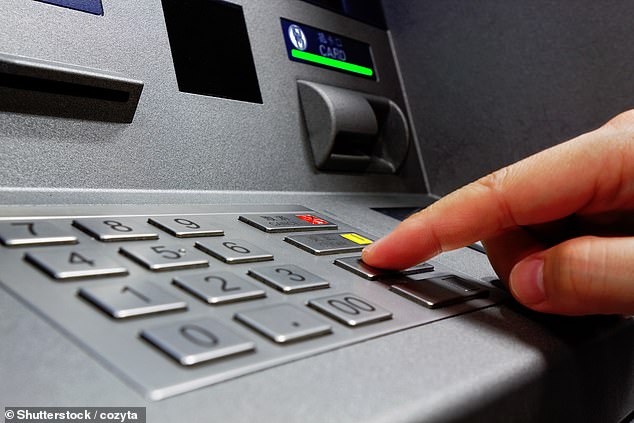How towns and cities across Britain could soon be left without a cash machine – as report warns ATMs are closing at record pace
Some areas of London and the East of England could be without cash machines within two years if the current trend of closures continues, a report has claimed.
South Cambridgeshire and the London suburbs of Ruislip, Northwood and Pinner could be without ATMs by June 2026, according to worrying projections from mobile payment terminal company Merchant Machine.
Industry body UK Finance warns that cash payments hit a new low last year, with just 12 percent of purchases made using coins and notes.
Only 2.6 percent of people spend mainly in cash, while two in five people only pay in cash once a month.
However, three quarters of people indicated that they still withdrew money last year, despite the decreasing number of ATMs.
John Howells, managing director of ATM networking group Link, said while cash continues to decline, it is still vital for millions of people.
Some areas of London and the East of England will be without cash machines within two years if the current trend of closures continues (File photo)

South Cambridgeshire and the London suburbs of Ruislip, Northwood and Pinner could be without any by June 2026, according to worrying predictions (File photo)
“Despite people no longer paying with cash, £1.6 billion a week is still spent across our network,” he said.
‘We remain fully committed to ensuring that people have free access to cash.’
The city’s regulator, the Financial Conduct Authority (FCA), said yesterday that banks must take action from September 18 if local communities lose access to cash services such as bank branches and ATMs, and must plug significant shortfalls.
Under the rules, the FCA cannot prevent a bank branch from closing, but can delay its closure until more cash facilities, such as banking hubs, are available.
Sheldon Mills, director at the FCA, said: ‘Three million people still rely on cash, even as digital payments become increasingly popular.
‘We have responded quickly to the new powers given to us by Parliament to ensure that there remains reasonable access to cash withdrawals and deposits.’
This is according to new research which shows that an estimated 25 million Britons aged 16 and over (45 percent) do not take their wallets with them when they go out, instead relying solely on their digital wallets as a means of payment.
Millennials and Gen Z were the most likely to leave their cards and wallets at home, with 66 percent and 72 percent respectively admitting to only going out with their phone. In comparison, just one in four Baby Boomers – 23 percent – and one in 10 members of the Silent Generation – 11 percent – said they would feel comfortable leaving the house with only a phone as payment, even for a short period of time.
